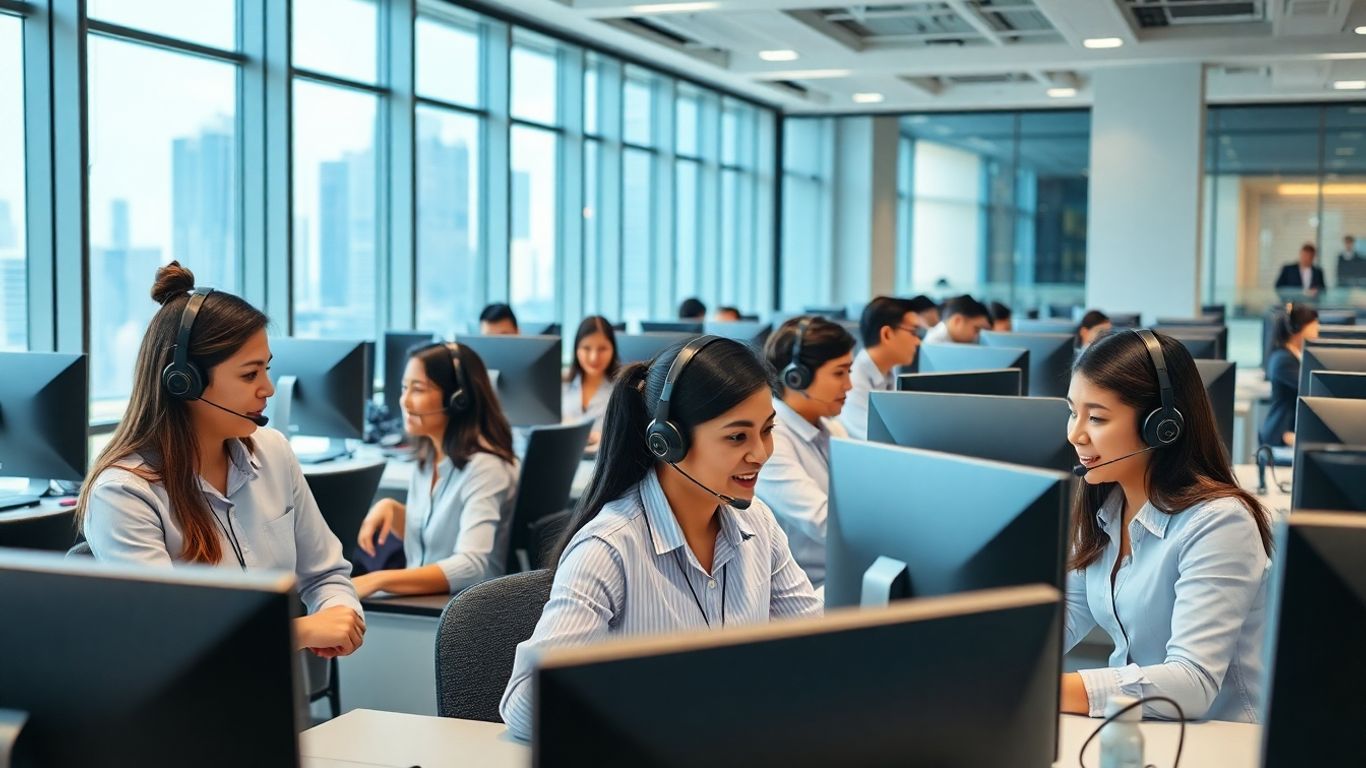If you've ever called a customer service hotline for a big brand, there's a good chance you spoke to someone from the Philippines. The call center in the Philippines has held its spot as a global leader for years, and it's not showing any signs of slowing down in 2025. This isn't just because of lower costs or time zone advantages—it's a mix of skilled people, smart tech, and strong support from both government and private companies. The industry keeps growing, adapting, and finding new ways to serve businesses around the world. Let's look at why the Philippines still leads the pack when it comes to call centers.

The consistent success of the Philippine call center industry boils down to its people. These aren’t just customer service agents—they’re skilled communicators and problem-solvers who genuinely connect with customers all over the world. Here’s why they stand out.
It’s almost a running joke in the global BPO world: if you call support and can’t quite tell where the agent is from, there’s a good chance they’re Filipino. The country ranks high on English proficiency indexes in Asia, with millions speaking the language fluently from childhood. Most agents have a neutral accent that’s easy for Americans, Australians, or Brits to understand—no awkward pauses, no repeated clarifications.
In fact, here’s a snapshot of how the Philippines stacks up on English skills in 2025:
Cultural exposure to Western holidays, media, and idioms helps agents tailor conversations to every customer. For businesses seeking strong AI + human models, this language comfort comes in handy when testing new customer experience tools like advanced AI answering services.
Filipino call center workers aren’t just trained to read scripts—they’re naturally warm and attentive, showing real patience and understanding in tough situations. Service runs deep in the local culture: people are quick to say “sorry” or offer help, even in everyday life. Customers pick up on this right away, and it makes everything—from refunds to complaints—a little less painful. If you’ve ever been on a call that felt less like an interrogation and more like chatting with a helpful friend, you probably know what I mean. The industry’s focus on relationship-building, not just problem-solving, stands out in customer feedback.
The BPO world never stands still, especially in the Philippines. Agents regularly join workshops, product immersion sessions, and communication skills upgrades, with thousands pursuing certifications in healthcare, finance, or tech support. In a typical year, over 500,000 new graduates enter the workforce—many with degrees in business or communications. Companies also partner with trainers to help staff adapt to hybrid models and new tech, like real-time AI voice assistants.
Many service reps will honestly tell you that their job isn’t just about answering calls—it’s about learning something new every single day, whether that’s about new software, tricky customer moods, or solving problems on the fly. That’s what keeps things interesting.
It’s this constant upskilling and genuine drive to serve that make the Philippine call center workforce not just relevant, but truly world-class—and one of the main reasons global organizations keep coming back year after year.
The call center sector in the Philippines didn't hit its global stride by accident—there's a lot going on behind the scenes, and much of it traces back to government moves and smart policies.
The creation of special economic zones and generous tax incentives by the Philippine government has fueled industry growth for years. Through bodies like the Philippine Economic Zone Authority (PEZA), BPO companies can access perks like multi-year income tax holidays, hassle-free import processes, and exemptions from a range of local fees.
This table barely scratches the surface, but helps show why so many global brands pick the Philippines for outsourcing. These advantages can bring about a 15-20% cost edge against other global call center hubs.
Let's face it, reliable power and fast internet aren't a given everywhere. Over here, the Department of Information and Communications Technology (DICT) works with the industry to keep things running smoothly, ensuring sites stay connected and protected. The government doesn't just stop at infrastructure; it also supports local education programs, prepping graduates with skills that matter to BPOs. Plus, with clear data privacy rules similar to GDPR, like those covered under the Data Privacy Act, clients from Europe and the US can rest easy their info is safe. If you're moving towards tech like an AI phone receptionist service, you can be sure the rules are clear and up to date.
Industry leaders don't just work in isolation. In the Philippines, the lines of communication between the government and BPO players are always open. They tackle problems together—whether it's training programs, regional development, or cybersecurity. These partnerships help:
The steady hand of government support and ongoing teamwork with business leaders remains a key reason why Philippine call centers keep setting the pace in 2025.
The Philippine call center sector keeps breaking new ground in 2025, especially with its ability to scale and flex with almost any business challenge thrown its way. For many global brands, this isn't just a nice-to-have—it's something they've come to rely on as market demands shift and pressure mounts.
When a business needs to grow fast (think viral marketing, product launches, or new seasonal campaigns), Philippine call centers step up. Major BPOs in the country can recruit, train, and deploy hundreds of agents within weeks—4 to 6 on average—while similar ramp-ups in Western regions often take months. Modular facilities and flexible workspace designs mean physical expansion isn't a headache either.
In practice, brands stop worrying about "How can we handle this surge?" and start focusing on growth instead, because they know the infrastructure is already in place.
Seasonal spikes aren't just a retail thing—they hit every industry, from healthcare to insurance. Philippine outsourcing providers can boost capacity by 30-40% for these peaks using targeted overtime, short-term contracts, and space optimization. More impressively, they scale down after the rush without painful layoffs or drawn-out legal wrangling. This operational elasticity leads to about a 25% cost edge over in-house teams, according to Frost & Sullivan’s analysis.
It doesn’t matter if a company needs five dedicated experts or 2,000 multilingual agents handling social, chat, and phone—in the Philippines, both are doable. Service providers set up custom configurations: fully dedicated teams, shared resource pools, or blended units combining humans and AI. Brands can pilot new tech, like unlimited parallel calls or advanced workflow automation, without shutting down what already works.
What global brands find is that flexibility here isn’t just big numbers or new tech toys—it’s being ready for the ups and downs of real business, with a partner who adjusts as quickly as they do.
The Philippines continues to hold its lead in the global call center industry by weaving the latest tech into daily operations. From AI-driven automation to quick data analysis, these upgrades aren’t just buzz—they’re the heartbeat of an industry that never stands still. Here’s a clear look at what’s setting the pace in 2025.
In the past, a spike in call volume might have meant busy signals and frustration. Now, with AI answering instantly and consistently, every caller feels heard—no matter how hectic things get.
Consistency across every customer touchpoint means brands keep their promises, even when customers pop up on three different platforms in a single day.
Cutting-edge technology isn’t just a badge of honor anymore—it’s the ticket to staying on top. In the Philippines, the future of call centers is already here: fast, flexible, smart, and ready for anything.

Call centers in the Philippines have built a reputation for their focus on customer experience. In 2025, this goes far beyond scripts and metrics—Filipino agents are empowered to create real, human connections in every single interaction. Many global brands point to these high customer satisfaction scores as the main reason they choose to outsource here.
Filipino call center agents are known for their ability to connect on a personal level. They don’t just provide answers; they build rapport and show genuine care for the person on the other line. This isn’t a happy accident—it’s a quality that gets developed, assessed, and rewarded on the job. Agents are trained to:
Human empathy is blended with technology, so even when issues are tough, callers feel seen and heard. Some advanced solutions, like AI phone receptionists for 24/7 customer service, further amplify this with instant, round-the-clock support while still sounding personable and natural.
Consistent, personalized attention fosters long-term loyalty, which often outlasts any discount or promotion.
Maintaining high standards isn’t just talk. Philippine call centers invest heavily in quality assurance to keep service top-notch. Here’s what goes into this process:
Agents know how their scores stack up—they get ongoing feedback and recognition for excellent performance, making quality improvements part of the culture.
Customers reach out in all sorts of ways and sometimes in different languages. The Philippines keeps up by:
Thanks to this multichannel support and language ability, companies can serve both local and global markets smoothly—there’s less risk of missed messages and more chances to impress every customer, every time. For businesses wanting to provide outstanding service, outstanding customer service strategies that include omnichannel support are key in today’s world.
The bottom line? The Philippine call center industry isn’t resting on its reputation. They keep setting the standard—with high empathy, strict quality control, and the ability to support customers wherever and however they reach out.

The Philippine call center industry in 2025 stands out because it doesn't just handle general support. Over time, centers here have put a sharp focus on fine-tuning skills for industries that demand specific knowledge. This isn't just about answering calls; it's about providing real business value by having staff deeply trained in different verticals.
Philippine contact centers are well-known for handling complex healthcare and insurance inquiries. Agents aren't just reading from scripts; they know the lingo and the workflows. Most staff receive real medical terminology training and understand how to manage insurance verifications or clinical scheduling.
Centers with intensive medical and insurance training provide a safety net for patients and clients, making sure sensitive information gets handled right every time.
The sector has also grown its finance and e-commerce chops. It's not just about taking orders or checking balances. Call center teams get rigorous training in local and international banking regulations, fraud detection, investment information, and secure payment handling.
Here's what makes these teams reliable partners for big brands:
Filipino teams manage everything from investment queries to online order escalations. They've become the first line of defense against fraud, bridging the gap between new fintech or e-commerce platforms and their customers. For advanced integrated support, many centers use AI for initial queries—AI phone receptionist solutions provide consistent answers—while human agents handle the most sensitive cases.
There's a clear shift toward high-value operations, like knowledge process outsourcing (KPO). This isn't just about support calls anymore; it covers tech troubleshooting, market research, and even technical documentation. Agents get certified in cloud services, software troubleshooting, and emerging tech, so they're not flustered by complex questions.
If you need help setting up complicated cloud software or tracking inventory for online sales, Filipino call centers have teams ready to take those calls. They work like an extension of your own tech support or operations crew.
The reach spans from Metro Manila into provincial cities, making it possible to scale up talent for any industry. With this kind of sector-specific training, the Philippines doesn't just answer questions—they become real business partners in healthcare, finance, and tech.

It's easy to look at the Philippines as all about cost savings when it comes to call center outsourcing. But that's really only half the story. Businesses get the cost advantage without losing the level of service that keeps customers happy and coming back. The industry has figured out the secret sauce: affordable operations, transparent contracts, and smart resource use—without letting quality slip.
Labor costs in the Philippines stay lower than in many Western countries, even as skills and English proficiency remain high. There's also more to budget benefits here:
Outsourcing contracts here are straightforward and easy to track. No hidden fees, no surprises:
The beauty of working with Philippine call centers is how flexible they are to client needs—resources are easy to scale up or down, and pricing models fit different types of businesses:
Businesses in 2025 are getting smarter about where every dollar goes. Outsourcing to the Philippines means you aren't sacrificing quality to save on expenses; instead, you're getting both sides of the equation in one neat package.
When the world shut down in 2020, call centers in the Philippines didn't just pause and wait it out. They went into action. Within weeks, about 90% of the workforce shifted from traditional office desks to home offices. That massive switch wasn't just about sending folks home with a laptop; it took quick investments in secure tech like VPNs, encrypted chat tools, and virtual desktops. Providers checked up on home office setups for reliable internet and decent workspaces. The result? Productivity actually rose by 5–8%, and employee turnover fell by at least 15%. Now, with restrictions behind us, remote work is here for good.
Moving call centers to homes didn't just weather the pandemic storm—it made the whole industry sturdier for every other storm that comes its way.
Hybrid work models aren't just a nice-to-have; they're a safety net. Here's how they boost business stability:
Hybrid models work especially well for companies integrating AI receptionists and automated solutions. Agents can monitor AI and step in only when needed, keeping a personal touch while reaping automation’s efficiency perks. Tools like an AI receptionist plan comparison show what modern remote work tools are capable of today.
Working from home isn’t just good for the bottom line—it actually makes employees happier, and happy employees stick around:
Many companies have also opened small satellite offices closer to where employees live, so when in-person work is needed for team meetings or big projects, it doesn’t turn into a logistical nightmare.
The blended model is now the norm, and it doesn’t just promise smoother operations during emergencies—it actually makes day-to-day life better for everyone involved.
Philippine call centers know the importance of protecting customer data. That's why they work with international rules like GDPR from Europe and HIPAA for healthcare. Every sensitive detail, whether it's about payment, health, or identity, is locked down tight.
A lot of leading providers don't just think about the basics. They set up security audits, require regular policy reviews, and keep up with updates. If you're in healthcare, finance, or e-commerce, you can expect full alignment with the standards that matter for your industry.
Protecting customer information is a daily effort, not a one-time thing. Top call centers layer lots of safety steps:
This means your business keeps running safely, even when using advanced tools like an automated AI phone receptionist or integrating cloud services. Companies aim to build trust with every interaction—they know one slip can break years of good reputation.
Security isn't just about locks and codes; it's being ready for anything. Providers have frameworks to spot problems early and react fast. Risk management includes:
Even with new tech and evolving threats, providers in the Philippines tend to be quick at updating protocols, so partners and clients never feel like they're left behind on compliance or risk management.
When regulations change or a client needs custom data handling, the response is fast and clear. This is a key reason so many global brands feel comfortable trusting Philippine call centers with their customer info—they see a focus on security that's just as strong as anywhere else in the world, and sometimes even stronger.
Staying at the front of the global call center industry has never been about standing still. The Philippines keeps its edge by making innovation a habit, not a buzzword. Companies here push boundaries, blending high-tech with that signature Filipino warmth—an unbeatable combo for building customer trust and loyalty.
Filipino call centers aren’t just about answering phones anymore. Every year, budgets are earmarked for:
The best call center agents in the Philippines have up-to-date technical skills—and the technology at their fingertips to deliver fast, smooth customer experiences.
People like to talk about automation, but in the Philippines, it’s already reality. Here’s how call centers get ahead with cutting-edge tools:
Embracing these tools means customers get accurate responses quickly and brands gather real insights at scale.
Call centers in the Philippines don’t just react—they spot changes early and shift gears before anyone else:
Three ways they stay ahead of the curve:
The takeaway? In the Philippine call center world, constant change is the only thing that never changes—and that’s why they’re still on top.
The Philippine call center industry doesn't just offer jobs; it's opened the door for millions of young people to start meaningful careers. Whether you're fresh out of college or switching sectors, there's a place for you here. Around 1.5 million Filipinos now work in business process outsourcing (BPO), and the vast majority are under 35.
Here's a quick look at employment trends in the sector:
Call centers have become a launchpad for young professionals, with many moving into management, tech, or specialized support roles within a few years.
It's not just the call center buildings bustling—dozens of other businesses thrive alongside the BPO sector. Office supply stores, small restaurants, local transport, and even digital upskilling centers keep very busy near BPO hubs.
These are some ways the sector drives growth beyond its walls:
Steady BPO employment isn't just about paychecks. It's about transforming whole communities. Cities like Bacolod, Davao, and Iloilo have seen new malls, better hospitals, and improved public services thanks to the local demand created by BPO workers.
The impact of BPO jobs stretches from families to whole neighborhoods, shaping a modern, upwardly mobile Philippines.
Collaboration is at the heart of why the Philippines call center industry leads globally in 2025. It's not just about low-cost labor or even great language skills anymore. The real magic comes from tight partnerships and a thriving ecosystem that pushes everyone forward together.
Philippine call centers work hand-in-hand with leading tech firms, both local and global, to keep operations sharp and future-ready. This isn’t a one-off handshake—it's an ongoing, daily thing. Providers of cloud software, AI, automation, and communications tech set up direct lines with call centers to roll out tools fast and train teams as soon as new features drop. Here’s what this means on the ground:
The result? Updates, fixes, and upgrades reach agents in days, not months.
Industry groups like the IT & Business Process Association of the Philippines (IBPAP) are at the center of it all. They rally companies, lobby for better rules, and arrange events where vendors, clients, and training partners all meet. This does a few things:
If you’re starting—or expanding—a call center in the Philippines, you’re stepping into an ecosystem that already knows how to scale a consulting business through partnerships, standard tools, and streamlined steps (collaborative partnerships). Here’s how the ecosystem supports you:
The difference in the Philippines isn’t any single innovation—it’s the way every part of the business connects. When technology, talent, and community line up, the whole sector moves fast and pulls global brands along with it.
When you team up with Frontdesk, you get more than just software—you join a group that works together for everyone’s success. Our active community of partners and users can help make your business stronger. Ready to take your business to the next level? Visit our website today to see how you can be part of our growing team!
So, after looking at everything, it’s pretty clear why the Philippines is still at the top of the call center game in 2025. The country has a huge pool of young, English-speaking workers who just get customer service. Companies from all over the world keep coming back because the service is reliable, friendly, and cost-effective. Even as tech keeps changing—AI, chatbots, all that—the Filipino touch hasn’t gone away. In fact, it’s gotten stronger, blending new tools with that natural warmth and patience people expect. Sure, there are challenges, like keeping up with new competitors and making sure workers stay happy, but the industry keeps adapting. If you’re a business looking for a place that can handle calls, chats, and everything in between, the Philippines is still the place to be. It’s not just about saving money—it’s about getting quality, flexibility, and a team that actually cares about your customers. That’s why the Philippines isn’t just holding its ground; it’s leading the way.
Companies pick the Philippines because the workers speak English well, understand Western culture, and are known for being friendly and helpful. The cost is also lower than in many other countries, but the quality stays high.
The Philippines stays on top by mixing skilled people with the latest technology like AI and automation. The government helps by giving tax breaks and supporting training programs. This makes it easy for companies to grow fast and keep up with new trends.
Filipino agents are known for being patient, kind, and understanding. They often speak with a clear, neutral accent, making it easy for customers from the US, UK, and Australia to understand them. Their natural friendliness helps create great customer experiences.
Yes, call centers in the Philippines follow strict rules to keep data safe. They follow global standards like GDPR and HIPAA, use strong security systems, and train staff to protect customer information.
Yes, they are set up to handle lots of calls at once, even during busy times like holidays or sales events. They use advanced AI and have lots of trained staff ready to help whenever needed.
They use AI to answer questions quickly, help with scheduling, and even send texts. They also use data analytics to improve service and offer support on many channels like phone, email, chat, and social media.
Yes, the Philippines has call centers trained for many fields, including healthcare, banking, insurance, e-commerce, and technology. Agents often get extra training or certificates to handle special topics or rules.
Yes, many call centers now let agents work from home or use a mix of office and home work. This helps keep employees happy, makes it easier to keep business running during emergencies, and attracts more skilled workers.
Start your free trial for My AI Front Desk today, it takes minutes to setup!








